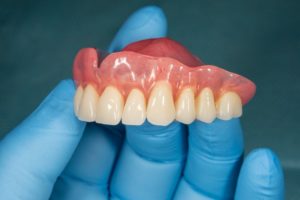
When you need an answer to your tooth replacement quandary, full or partial dentures can be a viable option. Whether you’re in need because of gum disease, serious oral trauma, or another reason, dentures offer an effective-yet-affordable solution. Dentures are not the longest-lasting tooth replacement option, however, and the time will come for them to be replaced. How can you tell when a switch is needed? Keep reading to learn from your denture dentist in Rocky Hill why it matters to make the move and the clues that let you know when to do so.
Why Does It Matter if I Get New Dentures?
Dentures are made specifically for your mouth so you can chew and talk with ease. As time passes, your bone density changes, and it will alter your bite.
It’s essential that you keep all your dental appointments so your bite can be monitored to ensure you continue to have a quality fit. This way, you’ll avoid denture damage and discomfort from issues like gum sores, plus you’ll be notified as soon as your current set is no longer sufficient.
What Are the Signs that I Need to Replace My Current Dentures?
Your dentist can let you know for sure, but here are some clues that it’s time for new dentures:
- Lifespan: Dentures have an average lifespan of 7-10 years, so if you’ve had your current set for a decade or more, don’t wait to make an appointment with your dentist to have them evaluated.
- Gum Irritation: Does it seem like your dentures now fit poorly even when you use dental adhesive? Sores or lesions may develop on your gums when this is the case. When you feel irritation, seek a replacement option from your dentist. It could be a result of your jawbone losing density over time.
- Stains: Discoloration can be an obvious indicator that it’s time for denture replacement. Even with proper care, some yellowing and staining can occur naturally. If you are self-conscious about your smile, this indicator will probably provide all the motivation you need to seek out a new set.
- Cracked, Chipped, or Broken: Dentures can wear down over the years and the process is accelerated with improper care. When you see damage to a denture, always have it repaired as soon as possible, since it will usually affect your fit. Depending on the level of damage, it could require replacement instead of repair.
Dentures have their benefits, such as affordability, they are noninvasive and easy to adjust as needed. But your dentist is counting on you to keep them informed when you have issues for whatever reason. Consult with them to see if an adjustment will get your smile back on the right track or if a replacement is warranted.
About the Author
Dr. Matt Scoles earned his dental doctorate from the University of Connecticut. He’s a member of the American Dental Association and has a fellowship in the Academy of General Dentistry. If you are interested in dentures, he, as well as Dr. Marc Scoles and Dr. Julia Karpman, utilizes high-quality materials for a natural-looking smile, dental insurance is accepted, and financing is available. Schedule a consultation on their website or call (860) 563-3766.
